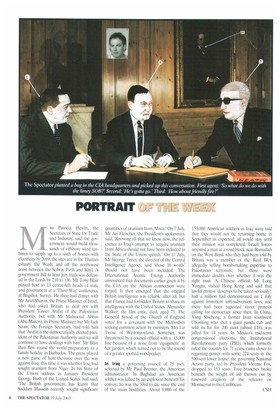M iss Patricia Hewitt, the Secretary of State for Trade and
Industry, said the government would build thousands of offshore wind turbines to supply up to a sixth of homes with electricity by 2010; the sites are in the Thames estuary. the Wash, and off the north-west coast between the Solway Firth and Rhyl. A government Bill to limit jury trials was defeated in the Lords by 210 to 136. Mr Tony Blair played host to 13 centre-left heads of state and government at a 'Third Way' conference at Bagshot, Surrey. He then had dinner with Mr Ariel Sharon, the Prime Minister of Israel, who had asked Britain to deal not with President Yasser Arafat of the Palestinian Authority, but with Mr Mahmoud Abbas (Abu Mazen), its Prime Minister but Mr Jack Straw. the Foreign Secretary, had told him that 'Arafat is the democratically elected president of the Palestinian Authority and we will continue to have dealings with him'. Mr Blair then flew round the world preparatory to a family holiday in Barbados. The press played a new game of hunt-the-issue over the war against Iraq; this time it was whether Iraq had sought uranium from Niger. In his State of the Union address in January President George Bush of the United States had said, The British government has learnt that Saddam Hussein recently sought significant
quantities of uranium from Africa.' On 7 July, Mr An Fleischer, the President's spokesman, said, 'Knowing all that we know now, the reference to Iraq's attempt to acquire uranium from Africa should not have been included in the State of the Union speech.' On 11 July, Mr George Tenet, the director of the Central Intelligence Agency. said 'those 16 words' should not have been included. The International Atomic Energy Authority announced that documents earlier given it by the CIA on the African connection were forged. It then emerged that the original British intelligence was reliable after all, but that France had forbidden Britain to share its intelligence with the United States. Alexander Walker. the film critic, died, aged 73. The General Synod of the Church of England voted for a covenant with the Methodists seeking common action by ministers. Mrs Liz Twose of Westonzoyland, Somerset, was threatened by a council official with a £5,000 fine because of a noise from 'equipment' in her garden, which turned out to be the sound of a greater spotted woodpecker.
In Iraq a governing council of 25 met, selected by Mr Paul Bremer, the American administrator. In Baghdad an American soldier was killed by an explosion beneath his convoy; he was the 33rd to die since the end of the main hostilities. About 9,000 of the
150,000 American soldiers in Iraq were told that they would not be returning home in September as expected; all would stay until their mission was completed. Israeli forces arrested a man at a road block near Ramallah on the West Bank who they had been told by Britain was a member of the Real IRA allegedly selling bomb-making expertise to Palestinian terrorists; but there were immediate doubts over whether it was the right man. A Chinese official, Mr Long Yongtu, visited Hong Kong and said that lawful protest 'deserves to be taken seriously'; half a million had demonstrated on 1 July against imminent anti-subversion laws, and there had been repeated street protests calling for democracy since then. In China, Yang Shicheng, a farmer from southwest Chonking who shot a giant panda cub and sold its fur for 200 yuan (about £18), was jailed for 14 years. In Mexico's mid-term congressional elections, the Institutional Revolutionary party (PR!), which formerly ruled the country for 71 years, came closer to regaining power with some 224 seats in the 500-seat lower house; the governing National Action party, led by President Vicente Fox, dropped to 153 seats. Tree branches broke beneath the weight of ash thrown out by renewed eruption of the volcano on Montserrat in the Caribbean.
CSH


























































 Previous page
Previous page